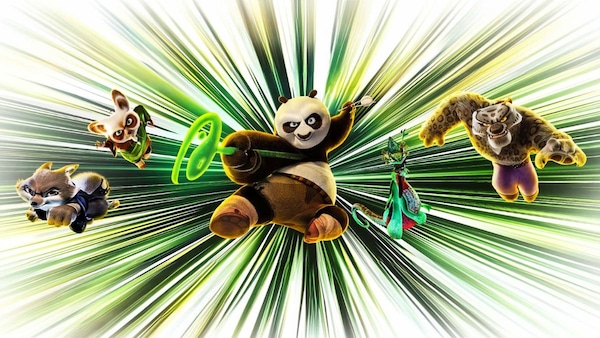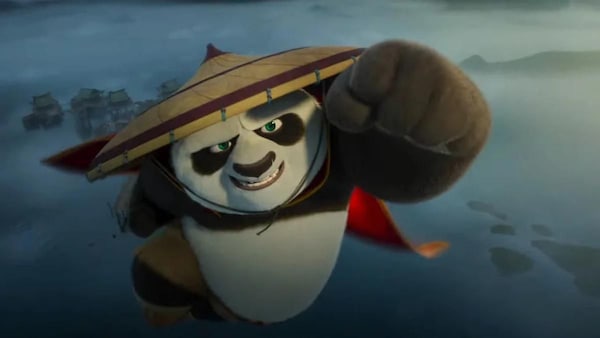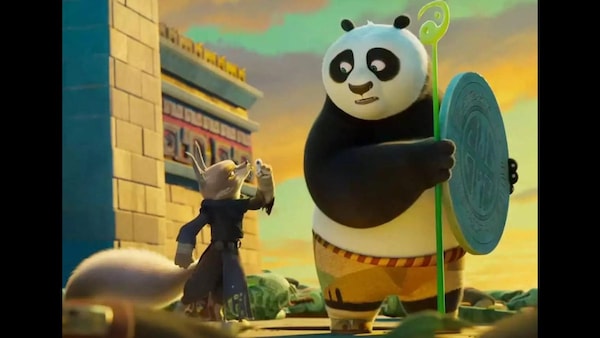Kung Fu Panda 4 Is A Reminder That The Animated Film Franchise Is What We Need & Deserve
Kung Fu Panda 4 is enjoyable in all the usual ways, but there's this disarming sense of life progression that defines the film, and in a way personalises the viewer's journey too.

Last Updated: 05.42 PM, Mar 16, 2024
KUNG FU PANDA 4, for many reasons, feels like home. The long-running animated film franchise about a giant food-loving panda becoming the unlikely messiah of a Chinese valley is subject to time and tide. This fourth installment has emerged 16 years after the first. And you can sense the real-world continuity in what is essentially a kiddie underdog-superhero series. After inadvertently becoming – and thriving as – the fabled Dragon Warrior of Peace Valley, Po (voiced by Jack Black) now finds himself having to fill the boots of Grand Master Oogway. It’s an honourable but ‘senior’ gig that Po is reluctant to take; this also means he will have to choose and train the next Dragon Warrior. Not to mention an all-in-one villain to vanquish: Chameleon (voiced by a towering Viola Davis), a sinister sorceress who can shape-shift into any animal she wants.
The euphemisms and metaphors of the Kung Fu Panda universe have always been striking. Ancient tortoise Oogway didn’t “die,” he ‘entered the Spirit Realm,’ not unlike Po’s nemeses from previous films Tai Lung and General Kai. Any violence is sugar-coated with cute cosmic terminology. Similarly, another message to its adolescent target audience emerges in the form of Po’s professional conflict. Po must become the new Spiritual Leader because, like in any other job, he must be promoted from a regional to national post. He can no longer limit his talents to the aura of a star middle-manager – he must oversee more of the company now. A grumpy Master Shifu insists that Po’s Dragon Warrior days are over, and he needs to look beyond the Valley of Peace.

An opportunity to test his senior mettle arises in the form of his journey to stop Chameleon – she terrorises Juniper City, a land far far away. A bandit fox named Zhen (voiced by Awkwafina) accompanies Po; she is practically a candidate auditioning for Po’s famous job. On the way, a few running gags reveal that nobody knows of the great Dragon Warrior outside of his valley, but everyone reveres the late Grand Master Oogway. Po realises that his big-fish-in-a-small-pond days are numbered; he needs to spread his influence far and wide. Even Chameleon’s motives are revealed to be fairly relatable: She was a failed Kung-fu fighter (because of her size), so she wants Po’s Staff of Wisdom so that she can summon all the masters from the Spirit Realm and steal their specific powers. In other words, early-career rejection makes her so bitter that she’d rather plagiarise and cheat her way up. Meanwhile, Master Shifu (Dustin Hoffman) is a little jealous in his own next stage of apprenticeship – as the trainer of the Furious Five – because he always aspired to emulate and succeed Oogway. Fortunately, much of this envy is playful, because Po is impossible to hate.
Kung Fu Panda 4 is enjoyable in all the usual ways, but it’s this disarming sense of life progression that defines it. There’s a parallel track of Po’s adoptive father Mr. Ping (James Hong) and his biological dad Li Shan (Bryan Cranston) secretly following their son on his journey; they’re paranoid about his safety. The quasi-queer two-fathers message aside, it’s a lovely ode to protective small-town parents who become nervous when their adult children grapple with the challenges of a big-city job. The evolving kinship between Po and an unruly Zhen reflects the mandatory mentor-protege trope – not least because Zhen’s inherent moral core is forced to change; “you’re a nice guy, unlike the other masters,” she says, surprised, at one point. Her upbringing has normalised corruption and hustling for so long that, suddenly, Po’s influence on her is like meeting Michael Scott after being a white-collar criminal.

Another thing this progression does: It personalises the viewer’s journey, too. When I watched Po defy all the prejudices and odds in Kung Fu Panda (2008), I was a drifter fresh out of college and wondering what to do with my life. I didn’t have the confidence to join the corporate setup, and something in me told me that I was a lot like the panda who wasn’t aware of his hidden talent and potential. I remember walking out of the film with my then-girlfriend and feeling seen: I wasn’t exactly a Dragon Warrior yet, but I knew I’d find my Valley of Peace soon. I watched the second film in 2011 with my late friend, when I had just begun to flirt with the idea of professional writing. He quietly encouraged me to move forward. I watched the third film alone in 2016, in between jobs, in need of a sign that film journalism was indeed the way forward. Po’s purity and sincerity as a fanboy of the martial arts while trying to make his own way – he still can’t help but gasp at the ‘awesomeness’ of his enemies, too – taught me something about loving what you do and doing what you love.
That purity makes Po vulnerable to thieves and deceit – plenty of which happens in this fourth film – but the panda never changes his black-and-white colours. At a time when I’m struggling to retain my emotional identity – forever at the crossroads of compromising on my own integrity to make more friends and be less alone – perhaps Kung Fu Panda 4 is a last-ditch reminder that, no matter what happens, you find your own tribe. There is no need to adjust. They either see you for who you are or hope to join who you become. At our core, we’re all just pandas, standing in front of the world, asking it to feed us.
